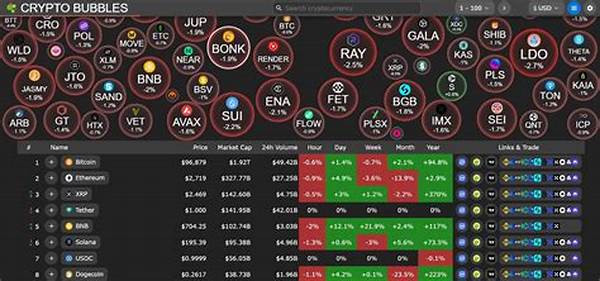Crypto Taxes 101 What Every Investor Must Know
H1: Crypto Taxes 101: What Every Investor Must Know
Navigating the world of cryptocurrencies can feel like treading through a digital wonderland where fortunes can be made or lost in the blink of an eye. With phrases such as blockchain and decentralized finance buzzing around, one may think they’ve entered an entirely new realm of finance. But amid the excitement and potential for profit, there’s a looming question every savvy investor must confront: “What about taxes?” Welcome to “Crypto Taxes 101: What Every Investor Must Know,” your definitive guide to demystifying the crypto-tax conundrum.
Read More : Why Ethereum Remains Strong For Beginners
It’s no secret that the emergence of digital currencies has redefined financial transactions, promising both opportunities and challenges. Yet, as dazzling as this realm can be, it’s essential to look beyond the allure and address the day-to-day realities and responsibilities. Cryptocurrency, like any other investment, is subject to tax obligations, and failing to adhere to these can lead to less-than-pleasant encounters with tax agencies. Though taxes might seem a buzzkill in the exhilarating narrative of crypto trading, equipping yourself with the right knowledge ensures you enjoy your digital assets without any unexpected detours.
Crypto taxes can seem like a daunting mountain to climb, not unlike assembling a piece of furniture without instructions. But fear not! This rosy-cheeked guide offers straightforward wisdom with a dash of humor to help you navigate digital currency taxation more effectively. Picture yourself as a trailblazer on a crypto expedition equipped with maps, tools, and plenty of light saber wit to boot. Dive in and explore essential tax principles every crypto investor should be aware of.
Understanding Crypto Tax Obligations
Let’s get down to brass tacks: A well-informed investor is a successful investor. As part of the new finance frontier, cryptocurrencies are subject to taxation based on your transactions and activities. Nevertheless, tax agencies, such as the IRS in the United States, have made it abundantly clear that crypto transactions are not exempt from tax regulations. These transactions are considered property for tax purposes, which means they’re treated much like stocks.
Whether you’re trading, selling, or even mining cryptocurrencies, each action can trigger a taxable event. The key to mastering crypto-related taxes lies in understanding these taxable events and maintaining meticulous records to accompany your tax returns. It’s time to embrace the mantra of “crypto taxes 101: what every investor must know” and chart your course toward tax compliance with confidence.
Key Principles of Crypto Taxation
Diving deeper, one must recognize that each crypto transaction can fall into different categories. Capital gains or losses are realized when you sell or trade crypto. If you hold crypto as a long-term investment (over a year), you might qualify for reduced tax rates, whereas short-term holdings are subject to regular income tax rates.
Mining cryptocurrencies presents its own set of tax rules, often counted as taxable income equivalent to the fair market value of the mined coins at the time they are received. Selling or using mined coins also results in taxable capital gains or losses, depending on the appreciation or depreciation of their value when sold or used.
Understanding the differences between capital gains and ordinary income is pivotal, as failing to differentiate could lead to an unpleasant surprise come tax season. Armed with knowledge, every investor can feel confident in their ability to navigate this landscape—a tale as grand as any epic, yet grounded in practical know-how.
H2: Common Crypto Tax Scenarios
In your quest for crypto enlightenment, you may encounter various tax-related scenarios that call for immediate attention:
1. Trading Cryptos for Other Cryptos: Yes, swapping one digital coin for another isn’t a tax-free ride. It triggers a taxable event based on the fair market value.
2. Using Crypto to Buy Goods/Services: Paying for that snazzy coffee with Bitcoin counts as a sale, and gains or losses must be reported.
3. Earning Crypto Interest or Dividends: DeFi platforms lure investors with promising rewards, but these are reportable income by tax standards.
4. Staking and Mining Rewards: Whether you’re expanding your crypto capital by staking or mining, these activities equal income taxed at its market value when received.
5. Receiving Airdrops or Forks: Free cryptos may seem magical, but Uncle Sam sees potential income requiring attention.
Understanding the labyrinth of crypto tax obligations ensures you’re not just playing defense but also strategically positioning yourself for success in this digital frontier.
Crypto Tax Strategies
Having acknowledged these complexities, how can an investor build a strategic plan to tackle the tax beast, maintain compliance, and maximize their profits? Let’s shed light on the “crypto taxes 101: what every investor must know.”
H3: Navigating Record-Keeping and Reporting
A fundamental step in managing crypto taxes is diligent record-keeping. Every trade, purchase, and transaction should be documented, including dates, values, and descriptions. Utilizing crypto tax software can simplify this process, offering automation and peace of mind. These platforms assist in calculating capital gains, providing accurate reports that reflect your crypto activities while minimizing errors. Staying organized is your golden ticket to appeasing the tax authorities and ensuring your crypto journey is as smooth as possible.
Embracing crypto taxes may not be as thrilling as riding the ups and downs of market trends or discovering the latest digital asset, but it’s an essential part of being a responsible investor. By mastering the essentials outlined by “crypto taxes 101: what every investor must know,” you’ll turn an otherwise daunting task into a manageable element of your investment strategy, paving the way for a prosperous and compliant future in the crypto world.



